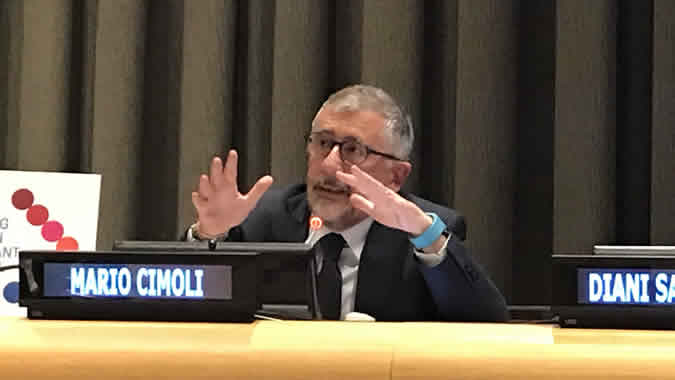Equality is Efficient Since it Contributes to Innovation, Productivity Growth and Environmental Protection: ECLAC
The organization’s Deputy Executive Secretary, Mario Cimoli, made a presentation on a high-level panel convened by the President of the UN General Assembly, in New York.

The Deputy Executive Secretary of the Economic Commission for Latin America and the Caribbean (ECLAC), Mario Cimoli, reaffirmed today that equality is the foundation of sustainable development and is economically efficient, since it contributes to innovation, productivity growth and environmental protection, during a high-level debate held at United Nations headquarters in New York.
The senior official from ECLAC was one of the main speakers at the “General Assembly High-Level Thematic Debate: Addressing Inequality toward Inclusive Development,” which was convened by the global body’s President, María Fernanda Espinosa, and in which the UN Deputy Secretary-General, Amina Mohammed, participated as well.
During his presentation on Panel No. 2, entitled “Sharing the best practices from national and regional perspectives toward inclusive development,” Mario Cimoli indicated that it is urgent for the problems of inequality to be resolved before it takes root, which means that development patterns must be changed.
“Inequality is inefficient. To be able to improve equality, what is done in the productive arena, and not just in the social arena, is key. And let us not forget about the relevance of technological and productive policies,” Cimoli stated.
He added that the work that can be done by the United Nations and its regional offices is key so that the middle classes are not vulnerable and inequality does not increase.
“As an example, there are three companies in the world that accumulate the capital of all of Latin America. Therefore, technological change is something that we also have to understand to think about equality. On this point, a regional perspective is key; having a Latin American vision about inequality and its underlying reasons,” he stressed.
In his remarks, ECLAC’s Deputy Executive Secretary recalled that the organization has insisted for the last decade that equality must be placed at the center of development and that it should not only be an outcome of sustainable economic models, but also an explanatory variable of their long-term efficiency.
“Equality, productivity and democracy are strategic complementary (not substitute) goods, all the more so in a world subject to strong economic, political and environmental tensions,” he said, adding that policies for social, labor and productive inclusion are necessary.
On the panel, the other speakers included Péter Szijjártó, Minister of Foreign Affairs of Hungary; Ghada Waly, Minister of Social Solidarity of Egypt; Diani Sadiawati, Deputy Minister of National Development Planning on Institutional Relations of Indonesia; and Anousheh Karvar, Special Envoy of France to the International Labor Organization (ILO).
During an exchange with the audience, the Brazilian representative to the General Assembly specially thanked ECLAC for all the work it has done on the issue of inequality in the region.
Type
Country(ies)
- Latin America and the Caribbean
Contact
Public Information Unit
- prensa@cepal.org
- (56 2) 2210 2040